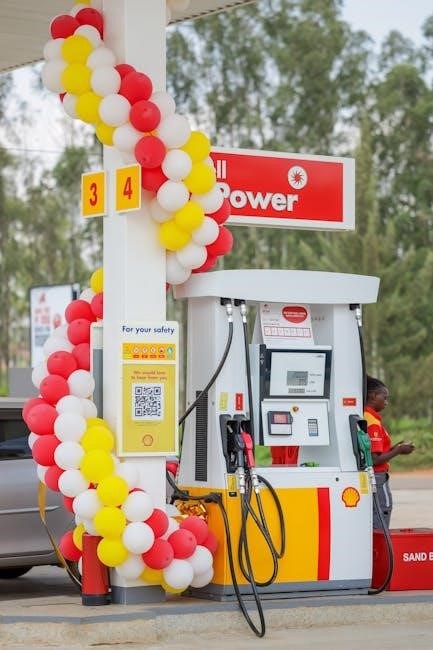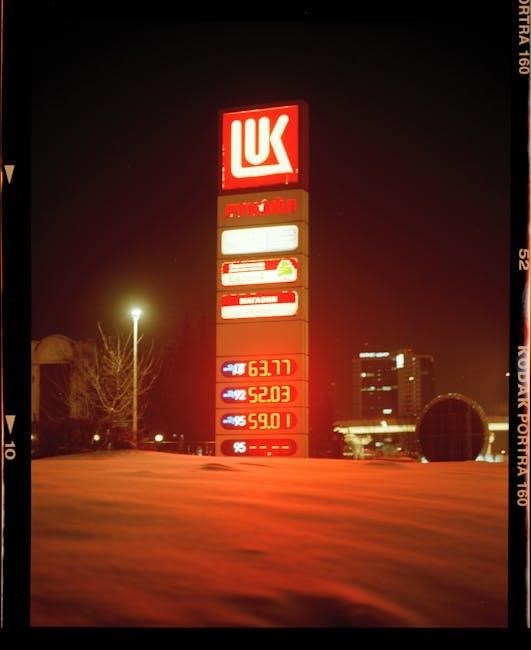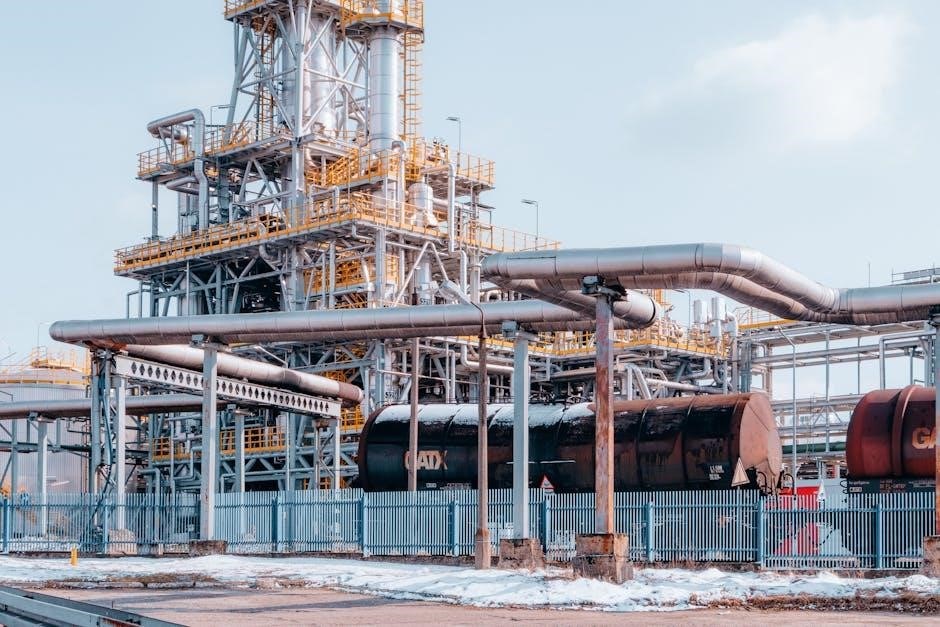Overview of the International Fuel Gas Code
The International Fuel Gas Code (IFGC) is a model code regulating fuel gas systems, including design, installation, and safety standards for gas-fired appliances and piping systems.
1.1 What is the International Fuel Gas Code (IFGC)?
The International Fuel Gas Code (IFGC) is a model code published by the International Code Council (ICC). It regulates the design, installation, and safety of fuel gas systems, including gas-fired appliances and fuel gas piping. The IFGC provides uniform standards for jurisdictions to adopt, ensuring safe and efficient fuel gas systems. It is widely adopted across the U.S. and its territories to promote public safety and compliance with industry best practices.
1.2 Purpose and Scope of the IFGC
The IFGC aims to safeguard public health and safety by regulating fuel gas systems. Its scope covers design, installation, and maintenance of gas piping, appliances, and related equipment. It applies to residential, commercial, and industrial settings, ensuring safe fuel gas use and compliance with industry standards. The code addresses gas-fired appliances, piping materials, and venting systems, promoting uniformity in fuel gas system regulations across jurisdictions.
Key Editions of the International Fuel Gas Code
The IFGC is updated periodically, with the 2021 and 2024 editions being the most recent. These editions provide updated regulations for fuel gas systems, ensuring safety and compliance with modern standards.
2.1 2021 Edition of the IFGC
The 2021 IFGC was published by the International Code Council, offering updated regulations for fuel gas systems. It includes design and installation requirements, safety standards, and appendices like sizing of gas piping and venting systems. Adopted by jurisdictions such as the City of McKinney, it became effective on January 1, 2023. The 2021 edition focuses on enhancing safety, improving compliance, and addressing modern fuel gas technologies. It is available as a PDF, with options for free downloads and purchases.
2.2 2024 Edition of the IFGC
The 2024 International Fuel Gas Code (IFGC) is the latest edition, developed by the International Code Council. It provides updated regulations for fuel gas systems, focusing on safety, design, and installation. This edition includes new provisions for gas-fired appliances and piping systems, ensuring compliance with modern standards. The 2024 IFGC is available as a PDF, with options for free downloads and subscriptions, offering enhanced features for users.

Key Components of the International Fuel Gas Code
The IFGC includes design and installation requirements, safety standards for fuel gas systems, and appendices with supplementary information like sizing and venting guidelines, ensuring comprehensive compliance.
3.1 Design and Installation Requirements
The IFGC outlines specific design and installation standards for fuel gas systems, ensuring safety and efficiency. It covers materials, sizing, and placement of gas piping and appliances; The code also addresses venting systems, combustion air requirements, and connections to ensure proper functionality; Compliance with these standards is critical to prevent hazards and ensure reliable operation of gas-fired systems. The guidelines are detailed to accommodate various applications, from residential to industrial settings.
3.2 Safety Standards for Fuel Gas Systems
The IFGC establishes stringent safety standards to minimize risks associated with fuel gas systems. These include requirements for leak detection, emergency shutoff valves, and proper ventilation. The code mandates regular inspections and testing to ensure system integrity. Safety protocols also cover appliance installation, piping materials, and protection against corrosion. Compliance with these standards ensures the safe operation of fuel gas systems, protecting both people and property from potential hazards. Adherence is enforced through rigorous enforcement mechanisms.
3.4 Appendices and Supplementary Information
The IFGC includes appendices that provide detailed technical information to support code compliance. These resources cover topics like sizing gas piping systems, venting requirements, and installation best practices. They serve as essential references for designers, installers, and inspectors. The appendices offer practical guidance, ensuring that fuel gas systems are installed safely and efficiently.
Supplementary information, such as tables and charts, further enhances understanding of complex code provisions. These tools aid in calculating pipe sizes, verifying system capacities, and meeting safety standards. The appendices and supplementary materials are invaluable for professionals working with the IFGC, ensuring accurate and reliable fuel gas system design and installation. They complement the main code text, providing a comprehensive framework for compliance and safety.

Benefits of Compliance with the IFGC
Compliance with the IFGC ensures enhanced safety, efficiency, and adherence to legal standards, reducing risks and operational costs while promoting public welfare and environmental protection.
4.1 Enhanced Safety in Fuel Gas Systems
The IFGC plays a crucial role in enhancing safety by establishing rigorous standards for fuel gas systems. It addresses design, installation, and maintenance to prevent hazards and ensure reliable performance. Compliance with the code reduces the risk of gas leaks, explosions, and carbon monoxide poisoning. Specific guidelines for material specifications, venting systems, and proper connections are emphasized. Regular inspections and testing further contribute to maintaining safety standards, protecting both people and property effectively.
4.2 Legal and Regulatory Compliance
Compliance with the IFGC ensures adherence to legal and regulatory requirements, as it is widely adopted by jurisdictions worldwide. By following the code, individuals and organizations avoid legal penalties and ensure their fuel gas systems meet mandatory standards. The IFGC is regularly updated to align with evolving laws and safety expectations, making it a cornerstone for legal compliance in the installation and maintenance of gas systems.
Local authorities often amend the IFGC to fit regional needs, but the core principles remain consistent. Staying compliant not only prevents legal issues but also demonstrates commitment to safety and regulatory integrity. This fosters trust and confidence among stakeholders, ensuring that fuel gas systems operate within the bounds of the law and industry best practices.
4.3 Economic Benefits of Adherence
Adhering to the IFGC can reduce costs by minimizing the need for costly modifications or legal fees. Compliance ensures efficient system design, lowering operational expenses and extending equipment lifespan. Businesses benefit from reduced liability risks and potential insurance savings. Additionally, adherence supports long-term economic stability by aligning with industry standards and avoiding penalties from non-compliance. Investing in IFGC adherence is a strategic move to enhance financial sustainability and operational efficiency.

Accessing the International Fuel Gas Code
The IFGC is available through official sources like the International Code Council (ICC) website, offering the 2024 edition as a downloadable PDF. Free downloads are limited, but subscriptions provide full access to the code, including updates and supplementary materials. Local jurisdictions may also provide access to adopted versions with regional amendments.
5.1 Official Sources for the IFGC PDF
The official PDF of the International Fuel Gas Code is available through the International Code Council (ICC) website, ensuring authenticity and compliance with the latest standards. Users can purchase the 2024 edition directly, with options for digital downloads or hard copies. Additionally, ICC offers subscription services that include access to the code, supplementary materials, and regular updates, making it a reliable source for professionals and jurisdictions alike.
5.2 Free Download Options and Limitations
Free downloads of the IFGC PDF are limited, as the full code requires purchase. However, the ICC offers a free trial for its Premium Subscription, granting temporary access to the code. Additionally, preview versions or specific sections may be available for free on the ICC website. Free downloads typically exclude the full, actionable code content, making them unsuitable for compliance or detailed work, and may only provide older editions like the 2021 IFGC.
5.3 Subscription and Purchase Options
The International Fuel Gas Code can be accessed through subscriptions or purchases via the ICC website. Subscriptions offer access to the full code, updates, and additional resources. Purchasing options include PDF downloads or hard copies of the code. The 2024 edition is available for purchase, ensuring compliance with the latest standards. Subscriptions are ideal for professionals needing ongoing access, while one-time purchases suit those requiring the code for specific projects or reference.
Common Applications of the IFGC
The IFGC is widely applied in residential, commercial, and industrial settings to ensure safe fuel gas system installations and compliance with regulatory standards.
6.1 Residential Fuel Gas Systems
The IFGC applies to residential fuel gas systems, ensuring safe installation and operation of gas lines, appliances, and venting systems in single-family and multi-family dwellings. It covers requirements for piping, connectors, and combustion air intake to prevent hazards like gas leaks or carbon monoxide poisoning. Compliance with the IFGC ensures that residential gas systems meet minimum safety standards, protecting occupants and property. Proper sizing and material selection are emphasized to handle varying gas demands efficiently.
6.2 Commercial and Industrial Fuel Gas Systems
The IFGC is crucial for commercial and industrial fuel gas systems, addressing higher capacity needs and complex piping requirements. It ensures safety, efficiency, and compliance in larger facilities, preventing hazards like gas leaks or explosions. The code provides guidelines for system sizing, material selection, and safety protocols tailored to industrial settings, ensuring operational efficiency and cost savings while maintaining stringent safety measures to protect people and property.

Challenges and Considerations
Accessing the IFGC PDF for free is challenging due to copyright restrictions, and staying updated with frequent code revisions requires ongoing effort and resources.
7.1 Regional Variations and Amendments
Regional jurisdictions often adopt the IFGC with local amendments, creating variations in requirements. For example, the 2023 Florida Building Code incorporates the 2021 IFGC with state-specific changes. These modifications can include additional safety measures, installation standards, or compliance deadlines tailored to regional needs. Staying informed about these variations is essential, as they can significantly impact design and installation practices. Accessing the latest versions of the IFGC with regional amendments is crucial for ensuring compliance and safety.
7.2 Keeping Up with Code Updates
Regular updates to the IFGC ensure adherence to the latest safety and technological advancements. The 2024 edition introduces new provisions, while the 2021 version remains widely adopted. Staying informed requires monitoring updates from the International Code Council and local jurisdictions. Professionals can access the latest revisions through official sources or subscription services. Annual checks and participation in training programs help ensure compliance with the most current standards, maintaining safety and efficiency in fuel gas systems.

Training and Resources
Educational guides and workshops provide in-depth knowledge of the IFGC. Certification programs and online courses help professionals stay updated on the latest code requirements and standards.
8.1 Educational Materials and Guides
Educational materials and guides for the IFGC are available to help users understand and implement the code effectively. These resources include detailed commentaries, study guides, and practice exams. They are designed for professionals, such as architects, engineers, and contractors, to ensure compliance with safety standards and best practices. Additionally, these materials provide insights into code updates and amendments, helping practitioners stay current with the latest requirements.
8.2 Workshops and Certification Programs
Workshops and certification programs on the IFGC are offered by professional organizations and training institutes. These programs provide in-depth knowledge of fuel gas systems, safety protocols, and code compliance. Participants learn about code updates, installation requirements, and inspection practices. Many programs include hands-on training and case studies, helping professionals gain practical expertise. Certifications are available for inspectors, installers, and designers, ensuring they meet industry standards and stay updated on the latest regulations.



